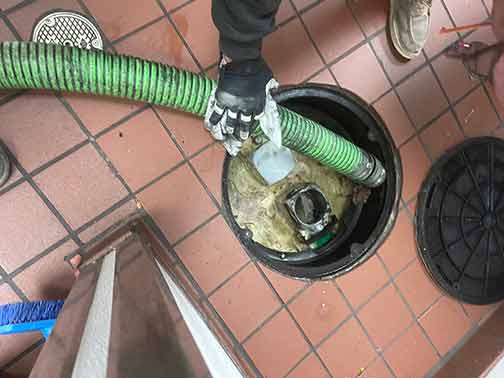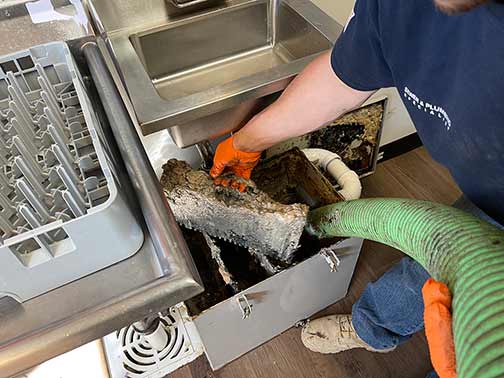As a restaurant manager, you know that commercial grease traps are an essential part of your kitchen’s plumbing system. These traps help to prevent fats, oils, and grease (FOG) from getting into your pipes and causing blockages, backups, and other plumbing issues. However, many restaurant owners and managers don’t realize the importance of routine grease trap cleaning. In this expert guide, we’ll explore the science behind how grease traps work, why routine cleaning is crucial, and tips for scheduling and maintaining your commercial grease trap.
Understanding Grease Traps
Grease traps, also known as grease interceptors, are designed to trap and separate FOG from water. These traps are typically installed in the plumbing line between the kitchen sink or dishwasher and the sewer main. As water flows through the grease trap, the FOG separates from the water and floats to the top of the trap. Meanwhile, heavier solids settle to the bottom. The remaining “clean” water flows through an outlet pipe and into the sewer line.
Grease traps come in various sizes, ranging from small under-sink models to large outdoor tanks. The size of your restaurant, its level of activity, and the size of your kitchen’s equipment all factor into the size of the grease trap you need. The larger the trap, the more effective it will be at separating FOG from the water.
Why Routine Cleaning is Important
But even the most efficient grease trap needs regular maintenance to keep functioning correctly. Here’s why:
Preventing Blockages
Over time, the FOG that accumulates in your grease trap will form a thick layer that reduces the trap’s capacity to hold water. When this happens, FOG and other solids will begin to flow through the grease trap and into your plumbing pipes. If left unchecked, the built-up FOG can cause blockages, backups, and other plumbing issues that can be costly to repair.
Complying with Regulations
The Environmental Protection Agency (EPA) requires commercial kitchens to have properly sized and maintained grease traps. Failure to comply with these regulations can result in hefty fines and other legal consequences.
Protecting the Environment
When FOG and other kitchen waste enter the sewer system, they can clog sewage treatment plants and cause harm to aquatic life. Routine cleaning reduces the amount of FOG that enters the sewer line, protecting the environment and complying with EPA regulations.

Some grease traps can be cleaned manually, while others require a grease trap pump-out service from a professional plumber.
Tips for Scheduling and Maintaining Your Grease Trap
Now that you understand why routine grease trap cleaning is essential let’s explore some tips for scheduling and maintaining your grease trap.
Determine How Often Your Grease Trap Needs Cleaning
The frequency of grease trap cleaning depends on the size of your restaurant and the volume of FOG your kitchen produces. As a rough guideline, most grease traps require cleaning every 30-90 days. But you may need cleanings more often if your restaurant is particularly busy or if you’re experiencing plumbing issues.
Choose the Right Cleaning Method
Some grease traps can be cleaned manually, while others require a professional grease trap cleaning service from a professional plumber. Some grease traps even come equipped with sensors that let you know when it’s time for a cleaning. Work with a licensed local plumber to determine the best cleaning method for your specific grease trap.
Train Your Staff on Proper Waste Disposal
The more FOG your kitchen puts down the drain, the more frequently your grease trap will need cleaning. Make sure your staff is trained on proper waste disposal techniques, such as scraping plates and pans before washing, using strainers to catch solids, and disposing of waste in trash bins instead of down the drain.
Don’t Neglect Other Plumbing Systems
While routine grease trap cleaning is essential, it’s also important to maintain other plumbing systems in your kitchen. This includes cleaning sink strainers, passing hot water through drains to dissolve any solids, and scheduling regular inspections to catch any potential problems before they become major headaches.
Conclusion
Routine commercial grease trap cleaning is crucial for preventing blockages, complying with regulations, protecting the environment, and maintaining a functional kitchen. It is best to work with a commercial plumbing specialist to determine the right cleaning frequency and method for your specific grease trap. Train your staff on proper waste disposal techniques, and don’t neglect other plumbing systems in your kitchen. With the right maintenance, your grease trap will continue to perform its essential function for years to come.
